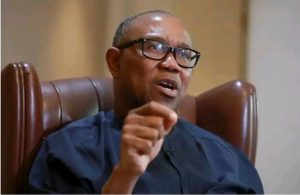
Peter Obi, former Labour Party presidential candidate, has raised concerns about Nigeria’s rapidly growing debt profile, warning that the country’s total public debt may surpass ₦200 trillion by the end of 2025.
This concern follows the Nigerian Senate’s approval of an additional $21 billion, €2.2 billion, and ¥15 billion in external borrowing for the 2025-2026 fiscal cycle, alongside a ₦750.98 billion domestic bond issuance and a €65 million grant.
Nigeria’s current total debt stands at approximately ₦187 trillion, resulting from adding the newly approved loans of about ₦37.2 trillion to the existing public debt of ₦149.39 trillion as of the first quarter of 2025.
This substantial debt burden has sparked fears about the country’s fiscal trajectory and its potential impact on future generations.
The debt-to-GDP ratio has become a significant concern, standing at 50.16% – the highest in Nigeria’s history.
Before the recent GDP rebasing, the debt represented nearly 70% of the previous GDP of ₦269.2 trillion.
Even after rebasing, which increased the GDP figure to ₦372.8 trillion, the debt-to-GDP ratio remains alarmingly high.
Despite the significant borrowing, critical sectors such as education, healthcare, electricity generation, and security have not seen substantial improvements.
Instead, Nigeria continues to grapple with Education. Underfunded and declining standards
Inaccessible health care to millions of Nigerians, particularly the poor.
Electricity stagnated below 5,000 megawatts for a population of over 200 million.
Economy deteriorated with over 10,217 deaths and 672 villages sacked between May 2023 and May 2025, despite increased security spending from ₦2.98 trillion in 2023 to ₦4.91 trillion in 2025
The country’s poverty situation is dire, with 133 million Nigerians (about 63% of the population) classified as multi-dimensionally poor.
The malnutrition crisis in Northern Nigeria is particularly alarming, with 652 children reported dead in Katsina State alone .
Peter Obi has urged the government to adopt a more disciplined approach to economic management, emphasizing the need to reduce wasteful spending.
Block revenue leakages, Invest in human capital, Promote a productivity-based economy.
Obi stresses that borrowing can be beneficial if tied to productive investments with measurable outcomes.
However, the current pattern of borrowing without accountability and transparency is mortgaging the future of Nigerian children.
He advocates for a New Nigeria with responsible leadership, people-centered development, and measurable impact from every borrowed kobo.






